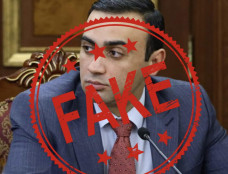
Cheese production increases in Armenia, issues remain a concern
The cheese production volumes have increased in Armenia in recent years, Gevorg Ghazaryan, the Head of the Agro-Processing Development Department of Armenia’s Ministry of Agriculture, said at a press conference on Saturday.
In his words, the cheese production volumes amounted to 22.3 thousand tons in 2016, increasing by over 20% to compare with 2015.
In regard to the imports of the product, the expert noted that it made up to 1100-1200 tons in recent years, with 1500 tons of exports registered. However, Gevorg Ghazaryan noted that the cheese exports volumes rose in 2016, reaching to 5600 tons.
The head of the department mentioned that in the Soviet Union, over 70 percent of Swiss and Roquefort cheese types were produced in Armenia. According to him, currently measures are taken to boost the production of those cheese types in the country as well.
Gevorg Ghazaryan said that more than 60 cheese manufacturing companies operate in Armenia. The sphere features both large and medium-sized enterprises and small factories or family farms. Almost all the cheesemakers are engaged in production of Lori and Chanakh cheese types.
The expert noted that the cheese production sphere underwent serious reforms in recent years; new technologies have been introduced, due to which various cheese types are produced in the republic in addition to the traditional ones.
As the official stated, the spheres of dairy and cheese production are under the constant spotlight of the Armenian Government, with necessary measures under way to improve the legal framework governing the sector and making it in line with the international standards.
Referring to the issues in the sphere, Gevorg Ghazaryan noted that in addition to the safe and quality milk, it is also necessary to introduce modern technologies and food safety systems to ensure high-quality products. Among the problems in the cheese sphere, he singled out the lack of financial resources for investments, re-equipment and marketing, absence of information on potential sales points and the wide circle of business ties. Mr. Ghazaryan pointed out the shortage of experts as an urgent issue in the field.
Newsfeed
Videos






























